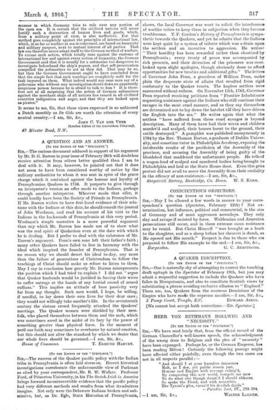[To THY EDITOR OF THE " SPECTATOR. " [ SIE,—The success of
the Quaker pacific policy withihe Indian tribe in Pennsylvania is often laid stress on. Recent historical investigations corroborate the unfavourable view of Parkman as cited by your correspondent, Mr. R. W. Walker. Professor Ford, of Princeton University, in his The Scotch-Irish in America brings forward incontrovertible evidence that the pacific policy had very different methods and results from what its admirers imagine. Not only were the Delaware Indians broken and sub- missive, but, as Dr. Egle, State Historian of Pennsylvania, shows, the local Governor was wont to solicit the interference of warlike tribes to keep them in subjection when they became troublesome. T. F. Gordon's History of Pennsylvania is sympa- thetic towards the Quakers, and yet ho admits that the Indians were kept quiet by a system of tribute which was a drain upon the settlers and an incentive to aggression. He writes: " Their hostility has been rewarded rather than chastised by Pennsylvania ; every treaty of peace was accompanied by rich presents, and their detention of the prisoners was over- looked upon slight apologies, though obviously done to afford opportunities for new treaties and additional gifts." The letters of Governor John Penn, a grandson of William Penn, make plain the desperate state of affairs that resulted from rigid conformity to the Quaker tenets. The hapless settlers wore massacred without redress. On November 15th, 1763, Governor Penn reported receiving petitions from " Frontier Inhabitants requesting assistance against the Indians who still continue their ravages in the most cruel manner, and as they say themselves are determined not to lay down the hatchet till they have driven the English into the sea." He writes again that what the settlers " have suffered from these cruel savages is beyond description. Many of them have had their wives and children murder'd and scalped, their houses burnt to the ground, their cattle destroyed." A pamphlet was published anonymously in 1764 by the Rev. Thomas Barton, a graduate of Dublin Univer- sity, and sometime tutor in Philadelphia Academy, exposing the intolerable results of the pacificism of the Assembly of the province, and accusing the Assembly of being guilty of the bloodshed that maddened the unfortunate people. He tells of a wagon-load of scalped and murdered bodies being brought to Philadelphia and laid at the State House door. Even this grim protest did not avail to move the Assembly from their credulity in the efficacy of non-resistance.—I am, Sir, &c., Seapatrick Rectory, Banbridge, Co. Down. W. S. KERB..


































 Previous page
Previous page